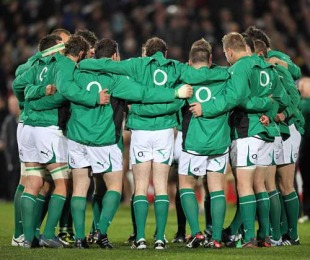|
Irish Rugby
It's not all bad for Ireland
Hugh Farrelly
May 30, 2010

Ireland must now re-group ahead of an epic season culminating in the Rugby World Cup
© Getty Images
Enlarge
At first glance, Ireland's summer tour to New Zealand and Australia reads like a pretty harrowing experience. Three defeats, making it an unprecedented five in-a-row for coach Declan Kidney, 14 tries conceded, the Jamie Heaslip red card incident and further injuries to add to the spate that decimated the touring party before departure. However, the positives outweighed the negatives in terms of fringe development and valuable homework on venues and opposition that will be encountered in little over a year's time at the World Cup. The opposition homework centred on Australia, 22-15 victors in last weekend's Test, who Ireland play in their World Cup-defining pool game next year. The Wallabies are in something of crisis at present. If what was essentially a third-string Irish side can run them to a converted score at the end of an arduous season, a full-strength Ireland must have a genuine shot at victory when it really matters. Defeat to England a week previously turned up the heat on Australia coach Robbie Deans and the nervy win over Ireland, on a night when there was little quality rugby on display, did little to appease the Kiwi's detractors. True, the Wallabies had their own absentee problems, particularly in the front five but there was little fluency to their much-vaunted backline despite plentiful possession and the forthcoming Tri-Nations when they will face confident New Zealand and South African outfits could see Australia badly exposed. Rocky Elsom is, on form, the best blindside flanker in world rugby but is playing like a man who needs a break from the game after almost two years of ceaseless effort. Furthermore, the captaincy appears to sit somewhat awkwardly on his broad shoulders. There have already been calls to relieve him of leadership duties allow him get on with playing the game but Deans has a squad that is defined by its youth and there are few obvious alternatives to Leinster's 2009 Heineken Cup-winning hero. Last November, David Pocock was being touted as one of the finds of the year, together with Springbok tearaway Heinrich Brussow. However, the new interpretations at the tackle and breakdown areas have proved somewhat emasculating for both open-sides and Pocock has been unable to kick on from last year. There were improvements in scrummaging in the second Test against England and against Ireland but even with the return from injury of Ben Alexander, Benn Robinson and Stephen Moore, the Aussie front-row is not necessarily one to be feared by the top scrummaging sides. They have quality at scrum-half in Will Genia (currently battling back from injury) and Luke Burgess and a clutch of dangerous runners out wide but, while the individual talent is evident, the collective fluency is not. Quade Cooper is the current pin-up boy at out-half and is undoubtedly talented but a look at the history of World Cup-winning out-halves does not suggest Cooper is ready to join their illustrious ranks.
Grant Fox (1987), Michael Lynagh (1991), Joel Stansky (1995), Stephen Larkham (1999), Jonny Wilkinson (2003) and Butch James (2007) were all No.10s capable of controlling a rugby match with fellow-Australian Larkham probably the closest to Cooper in terms of running approach. However, Larkham, although not characterised by his kicking, could still adopt a pragmatic approach from the pivotal role - as he did in 1999 - while Cooper is all about the mercurial. And showmanship. There is the Popeye stance for placed kicks and the bunny-jump that he executes almost every time he receives the ball - which is now being aped by his outside backs. It may look good for the punters and has been reasonably successful to date - with the help of poor Irish defence last Saturday - but this hop-and-skip trick will surely be worked out by opposition video analysts which leaves him vulnerable to turnovers. Matt Giteau's place-kicking inconsistency created a bizarre mix-and-match with Cooper against Ireland which seemed to revolve around Cooper taking on the difficult kicks and Giteau getting the 'gimmes'. Giteau is still only 27 but has over 80 caps since his debut in 2002 and represents the experienced figurehead in a callow backline. Although potent on the ball against the English, the first centre was ineffective against the Irish and Deans badly needs Giteau at his best for the Tri-Nations. Should that competition end in another bottom-placed finish for the Wallabies, as appears likely, the pressure will ratchet up on Deans once again. Australia are, arguably, the most patriotic sporting nation in the world and the fact that Deans hails from New Zealand adds extra edge to the barbs aimed in his direction. A seminal Tri-Nations for the Wallabies then, and one that will have a profound bearing on their progression to the World Cup. Kidney will be watching closely. © Scrum.com Hugh Farrelly is the rugby correspondent for the Irish Independent
| |||||||||||||||
Live Sports
Communication error please reload the page.
-
Football
-
Cricket
-
Rugby
-
- Days
- Hrs
- Mins
- Secs
F1 - Abu Dhabi GP
Abu Dhabi Grand Prix December 11-131. Max Verstappen ()
2. Valtteri Bottas (Mercedes)
3. Lewis Hamilton (Mercedes)
4. Alexander Albon ()
5. Lando Norris ()
6. Carlos Sainz Jr ()
-
ESPNOtherLive >>
Snooker - China Open
Tennis - Miami Open

